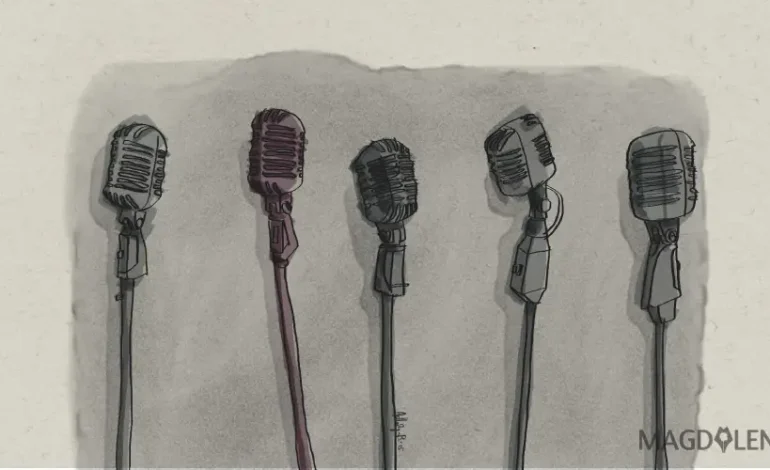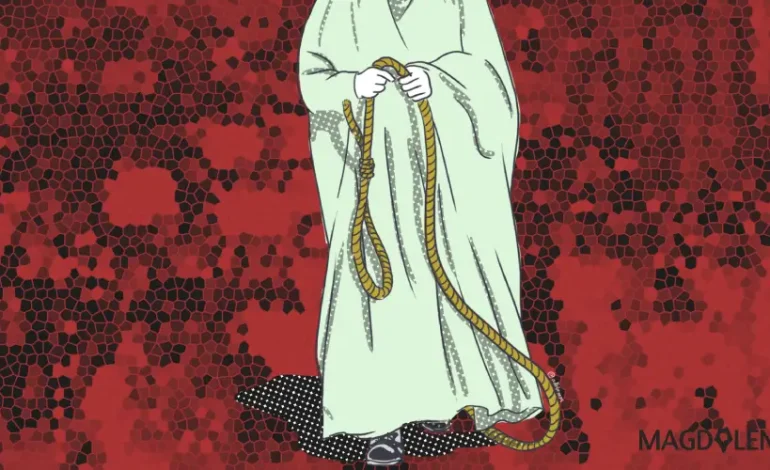On the Post-Natal Joys of Anggun’s “Elevation” A Decade Later

In modern media’s spirit of honesty and pursuit of relatability, the most commonly found postpartum narrative surrounding a famed child bearer is typically her struggle and strife with a new life as a mom. The likes of Alanis Morissette and Cardi B have helped popularize the term (and concept) of “postpartum depression” in the millennial lexicon, and for good reason: the condition is very much real and affects mothers everywhere, their social status notwithstanding.
For female musicians, this means a segue into their artistic output: Madonna’s Ray of Light, the blueprint for postpartum music, is replete with contemplations on the pop icon’s first brush with motherhood subsequent to the birth of her first offspring, Lourdes, two years prior to the 1998 release: the title track is only one of the many homages to her daughter scattered throughout the album. This overarching theme is made even more explicit by its follow-up single and album opener “Drowned World/Substitute of Love,” whose music video, mirroring the song’s central theme, finds the previous self-proclaimed Material Girl foregoing the fame and fortune she once reveled in, only to come home to the arms of her (fictional) baby.
A decade later in 2008, Indonesia’s most feted musical export, Anggun, unleashed Elevation, a Ray of Light-esque excursion that sees the fellow mononymous chanteuse dabbling in uncharted sonic territories, fusing R&B, hip-hop and dance influences into her oeuvre typified by its downtempo, oft-tribalistic qualities. Despite their identical premise, both albums could not be a more exact opposite of one another: while Ray of Light finds Madonna in no-holds-barred Earth Mama mode, highly fixated on thoughtful musings and visceral philosophizing (while simultaneously putting elements of an underground genre to its forefront), Elevation doubles as an observance of not only earthly matters but also carnal pleasures as well as a full-fledged embrace of the decade’s urban music trend.
This was no doubt inspired by the works of American producer Timbaland, who, at that point, was in the midst of a mid-career resurgence thanks to his inventive, genre-melding production skills sprinkled across Nelly Furtado’s Loose (itself concocted as a response to her shifting post-maternity perspective), Justin Timberlake’s FutureSex/LoveSounds and Björk’s Volta (which, perhaps not coincidentally, also contains tributes to her son and daughter).
Anggun made it no secret that Elevation was chiefly inspired by Loose, which she called “a perfect example of a successful collaboration between a pop singer and a hip hop producer”. Possibly intending to concurrently boost her credentials and expand her sound palette following the runaway success of 2005’s pop/rock-tinged Luminescence, she teamed up with Tefa and Masta, a respected and renowned production duo in the French rap scene, to craft Elevation.
Their collaboration began in earnest with the folky “Un jour sur Terre,” which served as the opening theme to the titular 2007 documentary narrated by the singer-songwriter and was eventually tucked into the tail end of Elevation’s tracklisting upon its eventual release in late 2008. Its preceding track, “Eden in Her Eyes,” however, is incontestably the album’s most on the nose dedication to Anggun’s daughter, Kirana – which, amusingly, translates to ‘ray of light’ in English – over sparse, strummy acoustic guitar. It is preluded by “Selamat Tidur,” a hushed acapella take on Indonesian language’s most sung lullaby, made all the more moving and affecting by Kirana’s own mewling.
The rest of Elevation tiptoes between the life-affirming effects of motherhood (see opener “A Change” and the faux-metal “Stronger,” undoubtedly the album’s most hair-raising moment that harks back to Anggun’s Indonesian back catalogue as one of the country’s leading rock acts) and the rapturous highs of new love, best exemplified in the album’s mid-section: “My Man” – which includes a verse by one third of the Fugees, Pras Michel – and “Give It to Love,” a blatant rehash of Furtado’s 2007 hit with Timbaland and Timberlake down to its very title and nearly skeletal backing beat.
The latter also provides something of a lyrical standpoint to the album title (“Take it to the higher ground” goes the song’s hook, repeated ad nauseam akin to a mantra) and contains one of the most intriguing lines ever penned by the artiste: “Sometimes honestly I don’t want to act like a lady,” delivered almost breathlessly at the conclusion of the bridge.
Adjectives like ‘sultry’ or ‘sensual’ have been strongly associated with the former lady rocker since her late 90s emergence in the international music scene; but whether in “Give It to Love” or “My Sensual Mind,” – of her 1997 self-titled English debut – there are layers of interpretation to be peeled from this seemingly undisguised admission, as if to simultaneously say, “I know how I come across to you, so I’ll just play around with it instead.”
Similarly, “Hide and Run” chastises a deceitful suitor in denial set to a galore of Middle Eastern strings (lifted from Iraqi superstar Kathem Al-Saher’s “Ashhadu”) and hard-hitting beats – the juxtaposition of which is also an archetypal Timbaland production – boasting an uncharacteristically assertive attitude (“I will chase you down / Unless you say it all,” concludes and stutters its chorus), laying a solid foundation to Anggun’s hypnotically agile vocalizing. It’s arguably the album’s most thrilling number, and without a doubt among the finest displays of the singer’s indisputable vocal prowess in her entire discography.
Elsewhere on the set are the album’s more introspective, inward-looking moments, such as the fittingly titled “Seize The Moment”. Not entirely dissimilar to Ray of Light’s chilling, free-form closer “Mer Girl” – a poignant ode to Madonna’s deceased mother, whose death in her childhood has been a key drive to the legend’s astronomic success as well as a lifelong source of grief – the song is an homage to Anggun’s late father, the artist and author Darto Singo, built on a sample of Ryuichi Sakamoto’s famous “Merry Christmas, Mr. Lawrence,”and peppered with fast-paced, skittering beats reminiscent of Justin Timberlake’s “My Love,” yet another acclaimed Timbaland production.
The tune was originally recorded as “Life Circle” and was notable for being one of the very few Anggun demos making its way to the interwebs. It underwent a significant rework before morphing into its final incarnation. Meanwhile, “No Song,” a rumination on lost love, signifies the album’s sole foray into with little more than haunting piano lines and faint string section. Probably her most classical-minded composition, it also adds an intriguing facet to the album’s otherwise upbeat predilection, a distinctly European touch to Elevation’s America-centric aesthetic.
Likewise, lead single “Crazy” is a slice of Eurodance confection that walks a very thin line between fluff and sophistication, underscored by driving beats and moody guitar riffs that recall Everything but the Girl’s 1995 dance smash “Missing”. Although perhaps released somewhat untimely just a year prior to the EDM craze taking over the globe, the floorfiller is nonetheless noteworthy for being the first out-and-out dance number pushed as a single from a regular Anggun studio album after years of flirtation with the genre via one-off collaborations and deep album cuts.
The Indonesian edition of Elevation is further supplemented by her version of “No Stress,” a Laurent Wolf-helmed banger that had been a pan-European hit earlier in the summer of ‘08 using the vocals of another singer; the pair wound up performing said version at that year’s World Music Awards, naturally making her the first ever Indonesian performer at the event.
Anggun has in more than one occasion contended that her music should be taken as a snapshot of where she is in life at the given moment. Elevation, even in its unabashedly en vogue approach and glamorous, divatastic accompanying imagery, is no exception.
If anything, its varied lyrical themes and sonic textures accurately capture the highs and lows of a woman’s state of mind and psyche in the wake of a life-altering occurrence. Once you have a life physically growing inside you for months on end and deliver it to the world, you will not come out of the experience quite the same person, both physically and mentally.
What Elevation impressively demonstrates is that there is another way to pull off the trick without resorting to overt self-seriousness, that it is possible to scratch the surface and go deep at the same time.
Despite its clearly commercial-leaning framework, Elevation was curiously met with muted public response upon its release outside of Indonesia, even with the sizeable R&B and hip hop market in her adopted home of France. She also quickly dismissed any assumption that Elevation was a calculated attempt at re-cracking the American market, where she had made rounds in the late 90s with her English debut, reiterating that she “doesn’t have any American dream” in easily the best write-up on the songbird in Indonesian media. (That said, this year marked her long overdue return to the American charts with not one but two Top 20 Billboard dance hits).
Although largely maligned by her core audience for being devoid of her signature music styles, Anggun, ever the tireless boundary breaker, has gone as far as saying that Elevation is her most favorite creation years following its initial release. Some might be puzzled by such declaration, but upon further inspection it becomes fathomable: both versions of Elevation were entirely co-written by her, a first for her French repetoire. Stylistically, she was also able to branch out of her comfort zone by being subject to work heavily with computers and samples instead of live instruments, in the process letting her hair down from her usual artistic modus operandi.
I would imagine the fact that it was written during the various stages of her maternity must have made it all the more special and remarkable bouts of creativity. This joie de vivre is palpable over the course of Elevation. There is a present, detectable sense of elation and openness that permeates the album: flaws and all, there’s no denying that Elevation still takes you to the higher ground today as it did ten years ago.






















